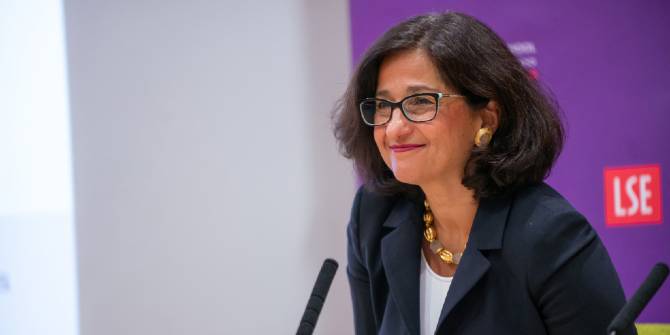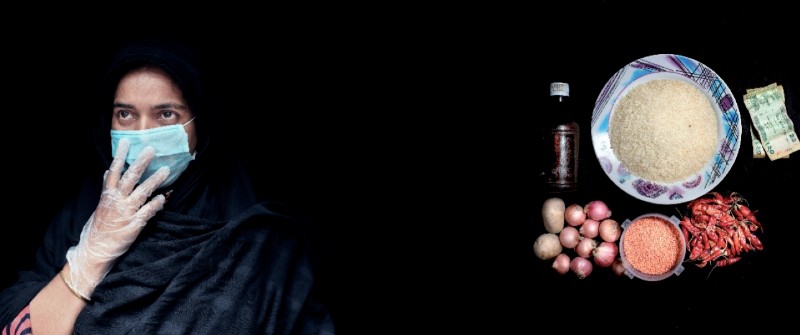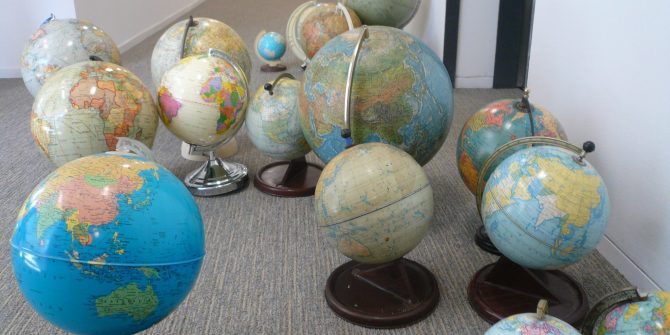As we lock ourselves down to contain the spread of COVID-19, it is tempting to think that the solutions to the pandemic lie at a national level, writes Minouche Shafik (LSE Director). But although it will probably stall world trade, the virus respects no borders. International co-operation, woefully inadequate so far, will be vital if the pandemic is not to re-emerge.
One of the paradoxes of this pandemic is that even as we are forced to turn inwards, we need each other’s cooperation more than ever. Most of us are becoming more self-reliant — staying at home, engaging less with others, even braving baking and home haircuts. And yet, only if everyone behaves in a collectively responsible manner will we be able to reduce infections and eventually normalise our economic and social lives.

That same paradox applies to the world economy and the global health challenges we face. Nation states too are turning inward and throwing unprecedented resources at containing the pandemic. But the pandemic does not respect borders. Even if one country defeats it, the risks of it returning are high as long as it continues to plague the rest of the world. The world is still interconnected, just in different ways.
What are the implications of the crisis for the world economy? And what does it mean for the balance of solving issues nationally versus globally?
Trade growth has probably peaked
Trade grew faster than GDP for several decades, but recent years have seen that slow. This crisis will accelerate that trend as supply chains will become shorter and more local. There are many reasons for this move toward localisation of production. Because of the crisis, companies will give greater weight to security of supply over efficiency and cost. Automation is reducing the importance of wages in production costs, making it possible for firms to “re-shore” facilities nearer to home markets. And localisation is also a way to shield oneself from protectionism and trade wars.
Globalisation will become more digital
While the movement of people and goods is likely to decline, trade of online services will grow rapidly. We have already seen the boom of online shopping, entertainment, and financial services during this crisis. The movement of data across borders is increasing exponentially. This makes resolution of issues like digital taxation, profit shifting by platforms across borders, and the prosecution of cross-border digital crime even more imperative.
Interest rates will be low for a very, very long time
Countries will emerge from this crisis with huge debt burdens. In past crises, those debts have been reduced through a combination of budgetary surpluses and economic growth rates that are greater than the rate of interest. Given how large debts are likely to become, it is hard to imagine being able to impose enough austerity to achieve the surpluses necessary to bring debt ratios down. Instead, many countries will likely resort to financial repression whereby savers earn returns below the rate of inflation to make it possible for governments to “inflate away” their debts. This will have implications for cross-border financial flows.
Demand for social insurance will rise
Warren Buffett famously said that when the tide goes in, you can see who is swimming naked. The coronavirus crisis has shown that millions of citizens around the world were in effect swimming naked – with no savings to fall back upon and no public safety net to support them and their families. Both poor and rich countries now have informal labour markets, as flexible modes of working have spread everywhere and employers’ commitment to their workers is ever weaker. So much of social policy in recent decades has shifted risks onto individuals in the name of efficiency and flexibility. The years ahead are likely to see a backlash against this as citizens demand that more health, work and old age risks be shared. While these are mainly national challenges, some will spill over into international agreements, especially around trade.
All of these trends will reinforce countries’ tendency to focus on their domestic issues. Yet everything we know from history tells us that restoring economic prosperity and global health will require countries to look outwards and cooperate globally.
The economic response must be global
Many commentators from emerging markets took to referring to the 2008 financial crisis as the “North Atlantic Financial Crisis” to signal that the problem emanated from the US and Europe and was not truly global. This time is different. The economic consequences of coronavirus will adversely affect every country in the world. Commentators like Gordon Brown and Larry Summers have pointed out that while governments have broken all the economic rules to respond to coronavirus at the national level, the international response has been woefully inadequate. Even in the rich world, highly indebted countries like Italy or Spain have been less able to support their economies and populations than others like Germany or the Netherlands. For poor countries, many of which now have well-developed systems to transfer income to the poorest households through cash transfers and mobile banking, even fewer resources are available. This crisis needs a truly global response that includes more resources for the IMF and other multilateral institutions, comprehensive debt relief for the poorest countries, and a coordinated stimulus for economic recovery.
The health response must be global, too
You cannot solve a global pandemic at the national level. Just as the economic response must be global, so the health response must include helping the poorest countries´ health systems to cope. The risks of spread in countries where social distancing is not possible (especially in slums, refugee camps and densely populated urban areas) may be devastating. Urgent funding is needed for essential equipment, vaccine development, therapeutics and support for weak health systems and vulnerable populations around the world. Without that, the epidemic will rage in highly populated parts of the world only to reappear in the countries that were hit first.
At a time when there are strong forces pushing inward, we need to remind everyone that it is in their national interest to think outwardly and globally. This is not just about generosity — though that is a great thing — but also self-interest.
This post represents the views of the author and not those of the COVID-19 blog or LSE.






Very intelligent start into that discussion on how the pandemic will effect the future global social and economical life, and how technology will play its fundamental role in upcoming changes (digitalization).
Maybe a few things are missing in Mrs. Shafiks approach which are in addition interesting to think about:
First I think the pandemic is a chance to achieve more human rights in the aftermath of the pandemic. Which could be by:
A.) Culturally and socially: I think the need to discuss the universal declaration of human rights and add that humans are social beings with a fundamental right to closeness, community the the unlimited access to cultural life and events. [This was taken during the pandemic, and we should evaluate how it can be avoided, that this never happens again]
B.) We should start to define “freedom” in the universal human rights declaration as being able to move freely across the planet and borders, to be globally mobile (however this can be achieved, and especially affordble to all on the planet) – > Thus, to get as humans really as global as trade and the mobility of goods are already today… I say: Freedom is realized by access to mobility in a global world!
Secondly we need to start the discussion how to sustain the economy that it would work with less crashes and overheating, while save-guarding the climate and natural resources on the planet…
And honestly, I think that discussion is a very long way to go…
A wonderful read amidst COVID-19 urging a global response to handle pandemics (formulation and implementation of policy decisions related to pandemics at international levels). Am also thinking an idea which if considered will help in bringing some new concepts in Welfare Economics during pandemics.
Regards
Dr. Abdul Latif
Very interesting stuff indeed!
Of course global solidarity and coop was and still considered key in several aspects of societies, yet one of the critical (albeit early) lessons learnt from covid-19 crisis, among many others, is self-sufficiency hence sustainability due to urgency need to mitigate the negative consequences of pandemic on health and economy, and also due to difficulty to rely on trade cross-borders, especially when countries set, in such situations, to force great lockdown internally and externally.
In other words, the urgent and pressing need to provide basics and treatment items to citizens will make states rethink about the envisaged role of national entities, public and private, to produce those stuffs that keep citizens survive, healthy and in reasonable welfare. Look at those (advanced) countries that were in pressing need to other countries to supply those most needful items. It was really unbelievable!
Crystal clear thinking….must be an LSE graduate.
And of course international cooperation is a good thing…like fatherhood and apple pie….who could argue with it. But but but; Isn’t it appropriate that we have different responses in different parts of the world. Whilst its the same virus won’t responses be more or less appropriate in different cultures, for different demographies and for communities with different policy choices. And then don’t we all learn from seeing what works and what doesn’t? Better a bunch of different local responses than one global guiding intelligence. Shouldn’t we be pleased that there are a bunch of different pharma companies working to discover/create vaccines…or should we end this “wasteful competition” and cooperate for the global good.
Global government…a solution looking for an answer.
Tim – Thank you for your insight – one of the lessons of this Spring will be the value of “different responses in different parts of the world”. I have found it odd in years past the casual indifference to the conflict between Global Government folks and the Every culture is valuable and autonomous folks – often one and the same, depending on the topic and the ability to place blame on Western Civilization for any issues engendered.
And in addition: I hope in the post-pandemic world all liberals will agree that (global) lockdowns do not become part of policy making… That this was an exception, an error that will never be repeated…
You present a clear assessment and offer a sensible mandate. But if a fully globalised approach is difficult to co-ordinate, then maybe stronger regional co-operation may be the next-best solution. Groupings like ASEAN need to be willing to find ways out of their national lockdowns together. In this regard, Australia and New Zealand are leading the way.
This is a compelling read. Thank you for sharing your thoughts and perspectives based on a balanced approach regarding the impact of the novel coronavirus pandemic. It’s through collaboration and partnership with resiliency that will make nations to contain this unfortunate international international public health emergency.
Great input and pertinent thoughts!
I coauthered in the same vein an article, a few weeks ago ,under the theme” Covid-19 and OIC Rapid Response Capacitation”.Sharing the belief that a global pandemic needs co-operation globally to be addressed and dealt with
Successfully,we proposed regional co-operation as a component of the global approach.Hence the proposed EPM
(Epidemics Prevention and Management Center for OIC countries).
Dame Minouche Shafik is indeed right. It is true that cosmopolitanism, open-mindedness, greater international cooperation through transparent, robust and resilient international institutions among many other pragmatic measures can go a long way in alleviating pain and mitigating suffering of the planet. It is also high time that we instituted effective mechanisms for pandemic surveillance, cyber security surveillance and similar ones. Next attack is staring us in the face. Better late than never. Once bitten twice shy.